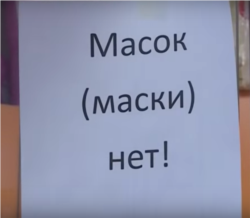With 146 confirmed cases of the Wuhan-based coronavirus now outside of China, fake news about the deadly respiratory disease and information about alleged vaccines are spreading rapidly throughout Central Asia, Russia, and Ukraine.
The trend appears to reflect the World Health Organization’s February 2 warning about a global “infodemic” of both reliable and unreliable information about the virus that obscures the facts.
In Russia, that can be seen by attempts to promote certain drugs as “vaccines” against the coronavirus. (Classified as the 2019 Novel Coronavirus, the virus is part of a general family of viruses that includes the common cold.)
Even before Russia announced its first two cases of the virus on January 31, some Moscow pharmacies had been displaying an ad that promoted Omega 3 pills and the common anti-flu drug Remantadin as vaccines, the Russian capital’s government-run Moskva 24 TV station reported.
The Russian consumer-rights watchdog Rospotrebnadzor has stressed that no coronavirus vaccine yet exists , but that, apparently, has not deterred all Russian pharmacies. Ads also promote as vaccines the common anti-flu medication Ardibol or Ingavirin, a medication still in clinical trials as a drug against the general coronavirus, Current Time’s Evening news show reported on January 29.
Fake cures also have been peddled in Ukraine, which began evacuating all Ukrainian citizens from China on February 1. No coronavirus cases have yet been recorded in Ukraine.
Last week, the Ukrainian e-commerce site Olx.ua offered an alleged coronavirus vaccine, supposedly “developed in Israel by the best specialists in their field,” for 2,500 hryvnia (about $100), Current Time’s Ivan Grebeniuk reported. Other site vendors offered Centrum Silver vitamins, made by the U.S. pharmaceutical company Pfizer, to ward off the virus.
After coverage by Ukrainian media outlets and Current Time, however, both items disappeared from the site. So-called “defensive masks,” with the word “coronavirus” in their title, also have been removed.
Ukrainians can face a potential fine or three years in prison for making fraudulent claims about items they are selling, said Kyiv attorney Vladislav Zaitsev.
To date, however, as in Russia, no one appears to have been prosecuted for selling a coronavirus “vaccine.”
Some Russian speakers on Twitter advise more familiar virus cures: drinking at least 250 grams of vodka or whiskey per day (particularly recommended for men); gargling with salt water; or eating onions and attaching them to the body, Footage Vs. Footage reported.
Other Twitter users, tongue in cheek, advised more extreme measures. After mainstream Russian media reported that AliExpress, a popular Chinese retail site, had stopped sending shipments to Russia because of the virus, memes proliferated about donning a chemical-hazard suit to receive an AliExpress delivery.
On January 30, AliExpress categorically denied to the RNS news agency that the virus had affected its business. It blamed any delayed deliveries to Russia on the Chinese New Year, a state holiday that Chinese regions have extended because of the virus,
China has already opened a makeshift, 1,000-bed hospital outside of the virus epicenter, Wuhan, to treat coronavirus patients more effectively, but some Russian-language Twitter put their own spin on the story.
Even before the hospital opened on January 28, memes, touting its construction in five days or less, presented various grandiose buildings as the supposed facility. One post by a supporter of Russian President Vladimir Putin showed the alleged hospital in the colors of the Russian flag.
Another Twitter user, @Reagan_Right, went still further and tweeted that the Chinese had launched this hospital into space within three days.
How much these reports are taken seriously is unclear, but other information is taken as less questionable.
Surgical face masks have become, perhaps, the most common preventive measure throughout Eurasia against the virus, even though scientists stress that they are no guarantee against infection.
In both Kazakhstan and Kyrgyzstan, which border western China and have strong economic ties with the country, face masks appear to be in short supply.
Over the past week, customers in the Kyrgyz capital, Bishkek, were buying between 250-300 masks at a time, a Bishkek pharmacy employee told Current Time Asia’s Daria Timofeeva on January 31.
Videos posted by Kyrgyz users on the messaging service Telegram that falsely claim to show people collapsing, dead, on the streets of Chinese cities could have motivated some of those rush purchases.
The Kyrgyz government has asked pharmacies not to sell more than 20 masks to one person. It has banned exports of surgical face masks from Kyrgyzstan.
Exports of the masks from Russia as well as neighboring China and Kazakhstan have now stopped, prompting the Kyrgyz Health Ministry to negotiate with other suppliers, the Kabar news agency reported. The Ministry promised a shipment of half a million on February 3.
Kyrgyzstan has closed its eastern land border with China and halted all flights to and from the country, the government announced on February 2. Individuals arriving from China with symptoms of the virus are being quarantined.
The Kyrgyz government has taken at least one step, to date, to block another kind of virus – disinformation.
On January 29, the Kyrgyz Interior Ministry announced that it had conducted an “explanatory-preventive discussion” in Moscow with one unidentified Kyrgyz man who had written extensively on WhatsApp that Chinese bananas infected with the virus had arrived in Kazakhstan. The man subsequently removed his social-media posts on the topic.
Kazakh Deputy Health Minister Kamalzhan Nadyrov last week shot down such posts as “fake information” and urged Kazakhs to trust “only verified and official sources.”
The Kazakh government has announced that all air travel to and from China will halt on February 3; trains and buses between the two countries already have been suspended. Visas for Chinese citizens have also been suspended, and a quarantine put in place.
In the Kazakh commercial hub of Almaty, responses to the rumors and reports about the virus seemed to vary.
“I think that, in general, this virus is complete nonsense,” said one young woman, “because on Instagram everyone writes that the Chinese are making money off of this and that’s it.”
A man in his 20s took a detached approach: As the virus spreads, concerns about personal health and immunity are understandable, he said, “but if you don’t think about this, everything will be fine.”








Facebook Forum